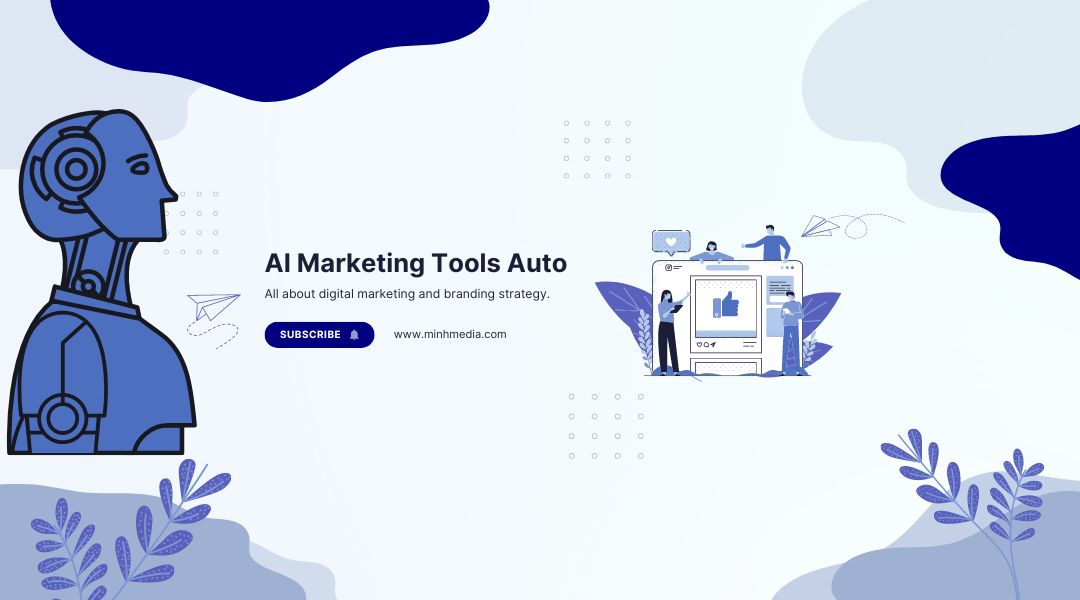Introduction
Overview of AI in Marketing
In recent years, Artificial Intelligence (the best AI marketing tools ) has dramatically reshaped the marketing landscape, bringing about a revolution in how businesses interact with customers, analyze data, and execute campaigns. Traditionally, marketing was a labor-intensive process, requiring significant manual effort in tasks such as data analysis, content creation, and customer engagement. However, AI has introduced a new paradigm, enabling marketers to automate these processes and make data-driven decisions with unprecedented speed and accuracy.
AI’s ability to process vast amounts of data in real-time allows for more personalized marketing, where messages and campaigns are tailored to individual customer preferences and behaviors. This shift toward data-driven marketing not only increases efficiency but also significantly improves the effectiveness of campaigns, leading to higher conversion rates and better customer satisfaction.
As AI technology continues to evolve, it is becoming more accessible to businesses of all sizes, allowing even small and medium-sized enterprises (SMEs) to leverage advanced marketing techniques that were once the domain of large corporations. In 2024, the integration of AI into marketing strategies is no longer optional but essential for businesses looking to stay competitive in a rapidly changing marketplace.
Importance of AI Tools in 2024
As we move further into 2024, the importance of AI tools in marketing cannot be overstated. The digital marketing environment is more complex than ever, with multiple channels, platforms, and customer touchpoints to manage. AI tools simplify this complexity by automating routine tasks, providing deep insights through advanced analytics, and enabling personalized customer experiences at scale.
The competitive landscape in 2024 is fierce, with businesses vying for attention in an oversaturated market. AI tools provide a critical edge, allowing marketers to optimize their strategies based on real-time data and predictive analytics. This capability is particularly crucial as customer expectations continue to rise, with consumers demanding more relevant and timely interactions from the brands they engage with.
Moreover, AI tools are becoming increasingly sophisticated, offering features like natural language processing (NLP), machine learning (ML), and deep learning, which can analyze customer sentiment, predict future trends, and even create content autonomously. These capabilities not only enhance marketing efficiency but also empower businesses to innovate and differentiate themselves in a crowded marketplace.
In summary, AI tools in 2024 are indispensable for any business serious about marketing. They are the backbone of modern marketing strategies, enabling companies to achieve greater precision, efficiency, and impact in their campaigns.
Methodology
Criteria for Tool Selection
Selecting the best AI marketing tools for 2024 involves a rigorous evaluation process based on several critical criteria. These criteria ensure that the tools not only meet the current needs of marketers but are also adaptable to future challenges and opportunities. The key criteria include:
- Ease of Use: The tool must be user-friendly, with an intuitive interface that allows marketers of all skill levels to leverage its capabilities. Usability is crucial because it determines how quickly and effectively a marketing team can implement the tool.
- Integration Capabilities: In today’s interconnected digital ecosystem, the ability of a tool to integrate seamlessly with other platforms (such as CRM systems, analytics tools, and social media platforms) is essential. Effective integration reduces data silos and allows for a more holistic approach to marketing.
- Return on Investment (ROI): The tool should demonstrate a clear and measurable ROI. This means that the investment in the tool should result in significant improvements in marketing efficiency, customer engagement, or sales.
- Scalability: The tool must be scalable to accommodate the growing needs of a business. As companies expand, their marketing needs become more complex, and the tools they use must be capable of handling increased data volumes and more sophisticated marketing strategies.
- User Feedback and Expert Reviews: Tools that consistently receive positive feedback from users and endorsements from industry experts are more likely to be reliable and effective. These reviews provide valuable insights into the tool’s real-world performance and potential issues.
Research Process
The research process for selecting the top AI marketing tools in 2024 involved a comprehensive review of the current market offerings. This process included:
- Literature Review: We began by examining recent studies, white papers, and industry reports on AI in marketing to identify the most promising tools and trends.
- Tool Demos and Trials: Where possible, we conducted hands-on testing of the tools. This involved using the tools in real-world scenarios to evaluate their functionality, ease of use, and integration capabilities.
- User Feedback Analysis: We analyzed user reviews and feedback from various platforms, including G2, Trustpilot, and Capterra. This analysis helped us understand the strengths and weaknesses of each tool from the perspective of those who use them daily.
- Expert Consultations: We consulted with industry experts, including digital marketing professionals, AI researchers, and technology analysts, to gain insights into the tools’ technical capabilities and future potential.
- Performance Benchmarking: Finally, we benchmarked the tools against each other based on the criteria outlined above, focusing on their ability to deliver measurable results in real-world marketing environments.
Ranking and Evaluation
The tools were ranked based on their overall performance across the criteria mentioned above. We used a weighted scoring system to ensure that the most important factors—such as ROI, integration capabilities, and scalability—had the greatest impact on the final rankings. This approach allowed us to provide an unbiased evaluation that reflects the tools’ actual value to businesses.
Our rankings also took into account the future-readiness of the tools, considering factors such as the development roadmap, ongoing support, and updates from the providers. This ensures that the tools recommended are not only effective today but will continue to deliver value as AI and marketing technologies evolve.
Top AI Marketing Tools for 2024
In-Depth Reviews
HubSpot

Overview:
HubSpot remains a leading platform in marketing automation and CRM, thanks to its comprehensive suite of AI-powered tools. The platform is designed to be an all-in-one solution, providing tools for email marketing, social media management, content management, and customer relationship management (CRM). HubSpot’s AI features, such as predictive lead scoring and automated workflows, enable marketers to streamline their processes and focus on strategic decision-making.
Features:
- Marketing Automation: HubSpot offers advanced automation features, including automated email marketing, lead nurturing, and customer segmentation. These tools help businesses target the right audience with personalized content.
- CRM Integration: HubSpot’s CRM is seamlessly integrated with its marketing tools, allowing for a unified approach to customer engagement.
- Analytics and Reporting: The platform provides detailed analytics and reporting features, powered by AI, to help marketers track the performance of their campaigns and make data-driven decisions.
- AI-Powered Recommendations: HubSpot’s AI engine suggests optimal times for sending emails, the best content to share, and more, helping to optimize marketing efforts.
Pricing:
HubSpot’s pricing is tiered, with the Starter plan beginning at $50 per month. More advanced features are available in higher-tier plans, with enterprise solutions tailored to large organizations.
Use Cases:
A tech startup used HubSpot’s automated email marketing to nurture leads more effectively, resulting in a 30% increase in lead conversion rates. This success was largely attributed to HubSpot’s AI-driven personalization features, which ensured that potential customers received relevant content at the right time.
Salesforce Einstein
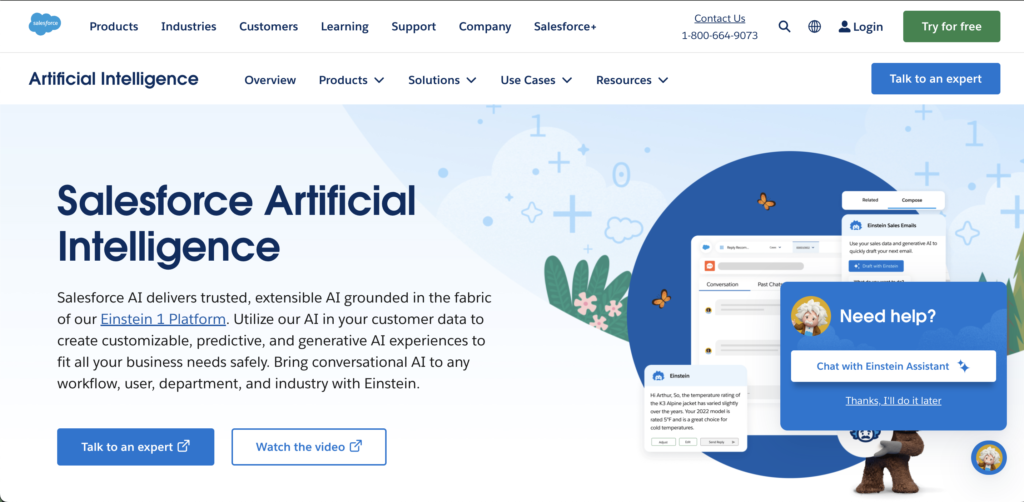
Overview:
Salesforce Einstein integrates AI capabilities directly into the Salesforce CRM, providing businesses with powerful predictive analytics and customer insights. Einstein’s AI-driven tools are designed to help sales and marketing teams anticipate customer needs, optimize marketing campaigns, and deliver personalized experiences at scale.
Features:
- Predictive Analytics: Salesforce Einstein uses machine learning algorithms to predict customer behavior, such as the likelihood of a lead converting into a customer. This enables businesses to prioritize high-value leads and optimize their sales strategies.
- Customer Insights: The platform analyzes customer data to generate insights that can be used to personalize marketing messages and improve customer engagement.
- AI-Powered Automation: Einstein automates routine tasks, such as data entry and report generation, freeing up time for sales and marketing teams to focus on strategic activities.
- Chatbots and Conversational AI: Einstein also includes AI-powered chatbots that can handle customer inquiries, provide product recommendations, and assist with transactions.
Pricing:
Salesforce Einstein’s pricing is customized based on the Salesforce package selected by the business. The AI features are available as add-ons to the standard Salesforce CRM packages.
Use Cases:
A retail chain implemented Salesforce Einstein to predict customer buying patterns, leading to a 15% increase in sales. By analyzing past purchase behavior, Einstein was able to recommend products that customers were more likely to buy, leading to higher conversion rates and customer satisfaction.
Sprout Social

Overview:
Sprout Social is a powerful tool for social media management, offering AI-driven insights that help businesses optimize their social media strategies. The platform provides tools for scheduling posts, monitoring engagement, and analyzing social media data to improve ROI.
Features:
- Social Media Scheduling: Sprout Social allows businesses to schedule posts across multiple social media platforms, ensuring consistent and timely engagement with followers.
- AI-Driven Insights: The platform’s AI engine analyzes social media data to provide insights into what types of content are resonating with audiences, when to post, and how to improve engagement.
- Social Listening: Sprout Social includes social listening features that track brand mentions, competitor activity, and trending topics, helping businesses stay ahead of the competition.
- Reporting and Analytics: The platform provides detailed reports on social media performance, including engagement rates, follower growth, and sentiment analysis.
Pricing:
Sprout Social’s plans start at $99 per user per month. Higher-tier plans offer additional features such as advanced reporting and analytics, social listening, and team collaboration tools.
Use Cases:
A digital agency used Sprout Social to improve its clients’ social media engagement by 25%. By leveraging Sprout.
Comparison Table
| Feature | HubSpot | Salesforce Einstein | Sprout Social |
|---|---|---|---|
| Marketing Automation | Comprehensive marketing automation capabilities | Limited marketing automation features | Social media scheduling and automation |
| CRM | Built-in CRM for managing customer relationships | Integrates with Salesforce CRM | No built-in CRM |
| Predictive Analytics | AI-powered lead scoring and content recommendations | Predictive scoring for sales opportunities and leads | AI-driven insights for social media engagement |
| Social Media Management | Social media scheduling and monitoring | No built-in social media management | Comprehensive social media management capabilities |
| Chatbots | AI-powered chatbots for customer support | Einstein Bots for customer service and recommendations | Bot Builder for creating custom social media chatbots |
| Pricing | Various pricing plans based on features and contacts | Pricing based on Salesforce edition and user licenses | Various pricing plans based on features and users |
AI has fundamentally altered the landscape of marketing automation, enabling businesses to manage and execute complex marketing strategies with minimal manual intervention. AI-powered marketing automation tools streamline repetitive tasks, optimize marketing campaigns, and provide valuable insights that drive decision-making. In 2024, the role of AI in marketing automation is more crucial than ever, as it allows businesses to stay competitive by delivering personalized and timely content to their audiences at scale.
Marketing automation with AI is particularly effective in areas such as email marketing, lead scoring, content distribution, and customer segmentation. AI algorithms can analyze vast amounts of data to identify patterns and trends, enabling marketers to create highly targeted campaigns that resonate with individual customer preferences. This level of personalization is difficult, if not impossible, to achieve manually, making AI-driven automation a game-changer in the marketing world.
Implementing AI marketing tools can yield impressive results, and numerous case studies demonstrate this potential. For instance, a mid-sized eCommerce company utilizing HubSpot saw a 30% increase in lead generation within six months of adopting the platform.
Similarly, a tech startup employed Salesforce Einstein to refine its email marketing strategy, resulting in a 25% boost in open rates due to more relevant content tailored to customer preferences. These real-world examples illustrate how the right AI marketing tools can dramatically impact business outcomes.
AI Marketing Automation Tools
The key to effective marketing lies in streamlining processes and automating repetitive tasks. AI marketing automation tools excel in this regard, allowing businesses to focus on strategic initiatives instead of mundane responsibilities.
Overview of AI Automation in Marketing
AI-powered marketing automation tools have redefined the way marketers approach their campaigns. By automating tasks such as email sequencing, lead scoring, and content distribution, marketers can allocate their time and resources more efficiently.
These technologies operate on algorithms that analyze user behavior, segment audiences, and trigger automated actions based on specific events. The result is a more responsive marketing strategy that can adapt to changing consumer preferences and behaviors in real time.
Top Tools for Automation
Several standout tools are shaping the landscape of AI marketing automation, providing functionality that enhances marketing strategies.
ActiveCampaign
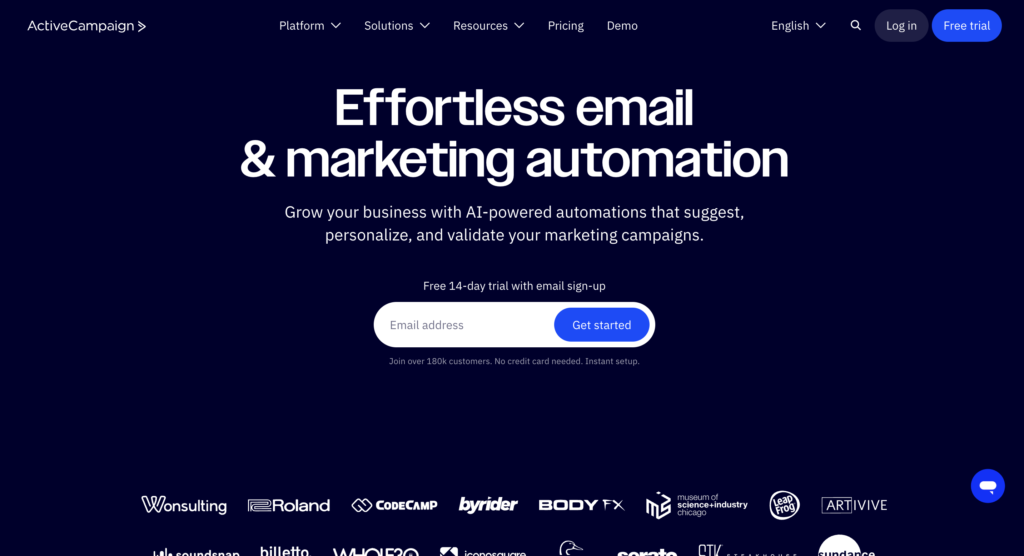
Overview:
ActiveCampaign is a leading marketing automation tool that combines email marketing, automation, CRM, and machine learning to help businesses create personalized customer experiences. The platform’s AI capabilities are particularly useful in automating email campaigns, lead scoring, and customer segmentation.
Features:
- Email Marketing Automation: ActiveCampaign allows businesses to create complex automated workflows that trigger emails based on customer behavior, such as website visits or previous purchases. The platform’s AI engine optimizes email delivery times and content to maximize engagement.
- Lead Scoring: ActiveCampaign uses predictive lead scoring to prioritize leads based on their likelihood to convert. This feature helps sales teams focus their efforts on high-value prospects.
- Customer Segmentation: The platform’s AI-driven segmentation tools automatically group customers based on their behavior, preferences, and interactions, allowing for more targeted marketing efforts.
- Predictive Content: ActiveCampaign’s predictive content feature uses machine learning to suggest the most relevant content for each individual customer, improving the effectiveness of email campaigns.
Pricing:
ActiveCampaign’s pricing starts at $9 per month for the Lite plan, which includes basic automation features. The Plus, Professional, and Enterprise plans offer more advanced features, with pricing tailored to the needs of larger organizations.
Use Cases:
A small e-commerce business used ActiveCampaign to automate its email marketing and saw a 20% increase in email open rates. By leveraging AI-powered segmentation and predictive content, the business was able to deliver more relevant and engaging content to its customers, resulting in higher conversion rates.
Marketo
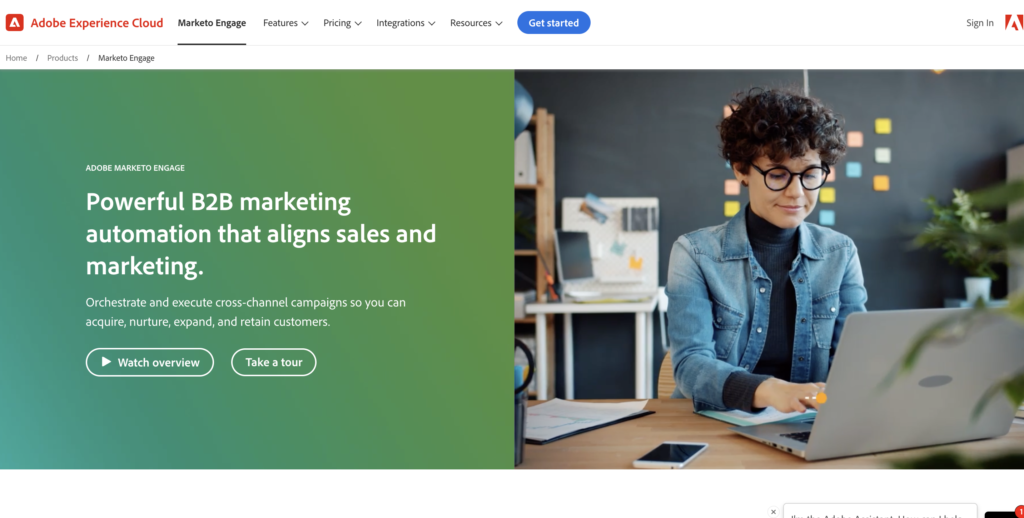
Overview:
Marketo, part of Adobe Experience Cloud, is a robust marketing automation platform that offers a wide range of AI-powered tools for lead management, email marketing, and analytics. The platform is designed for enterprises looking to scale their marketing efforts and optimize customer engagement across multiple channels.
Features:
- Lead Management: Marketo’s AI-driven lead management tools enable businesses to score, nurture, and prioritize leads based on their behavior and engagement with marketing content. This helps sales teams focus on the most promising leads.
- Email Marketing Automation: Marketo offers advanced email automation features, including dynamic content personalization, A/B testing, and automated workflows that adapt to customer behavior in real time.
- Analytics and Attribution: The platform’s AI-powered analytics tools provide deep insights into campaign performance, customer journeys, and ROI. Marketo’s attribution models help marketers understand which channels and campaigns are driving the most value.
- AI-Driven Personalization: Marketo’s AI engine personalizes marketing content across email, web, and mobile channels, ensuring that customers receive the right message at the right time.
Pricing:
Marketo’s pricing is customized based on the needs of the business, with different modules available for email marketing, lead management, and analytics. Pricing typically starts at a few thousand dollars per year for the basic package, with enterprise-level solutions costing significantly more.
Use Cases:
A large B2B company used Marketo to automate its lead nurturing process, resulting in a 30% reduction in the time it took to convert leads into customers. The AI-driven lead scoring and personalized email campaigns played a significant role in improving conversion rates and accelerating the sales cycle.
Funnel.io
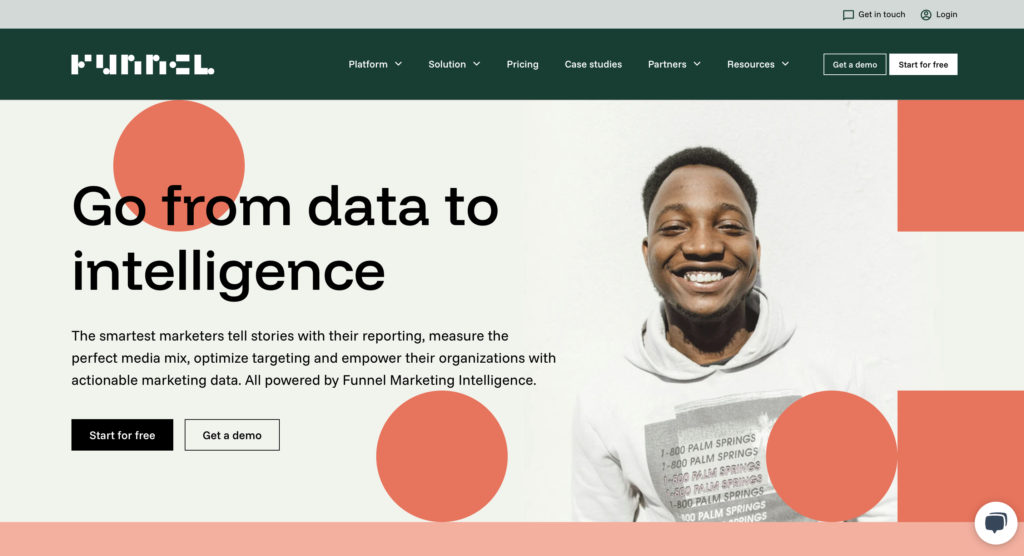
Overview:
Funnel.io is a data automation tool that specializes in collecting, transforming, and visualizing marketing data from various sources. While not a traditional marketing automation tool, Funnel.io plays a critical role in the automation of data collection and reporting, making it easier for marketers to analyze and optimize their campaigns.
Features:
- Data Collection: Funnel.io connects to over 500 data sources, automatically pulling in data from advertising platforms, CRM systems, and analytics tools. This eliminates the need for manual data entry and ensures that marketers have access to the most up-to-date information.
- Data Transformation: The platform’s AI-powered data transformation tools automatically clean, normalize, and aggregate data, making it easier to analyze and use in reporting.
- Custom Dashboards: Funnel.io allows marketers to create custom dashboards that visualize key performance indicators (KPIs) and campaign metrics. These dashboards can be easily shared with stakeholders, providing a clear overview of marketing performance.
- Integration with BI Tools: Funnel.io integrates seamlessly with business intelligence (BI) tools like Google Data Studio, Tableau, and Power BI, allowing for advanced data analysis and reporting.
Pricing:
Funnel.io’s pricing is based on the number of data sources and the volume of data processed. Plans start at around $399 per month, making it a premium solution for businesses with complex data needs.
Use Cases:
A digital marketing agency used Funnel.io to automate the collection and reporting of marketing data across multiple client accounts. This saved the agency over 100 hours per month in manual data entry and allowed for more accurate and timely reporting, ultimately leading to better campaign optimization.
Benefits and Drawbacks of AI in Marketing Automation
Benefits:
- Efficiency: AI-driven marketing automation tools significantly reduce the time and effort required to manage marketing campaigns. By automating routine tasks such as email marketing, lead scoring, and data analysis, these tools free up valuable time for marketers to focus on strategy and creativity.
- Personalization: AI enables a high degree of personalization in marketing campaigns, delivering relevant content to individual customers based on their behavior, preferences, and past interactions. This level of personalization is key to improving customer engagement and conversion rates.
- Scalability: AI-powered tools are highly scalable, allowing businesses to manage large volumes of data and execute complex marketing strategies as they grow. This scalability is particularly important for businesses looking to expand their reach and increase their market share.
- Data-Driven Decision-Making: AI tools provide deep insights into customer behavior and campaign performance, enabling marketers to make data-driven decisions that improve the effectiveness of their strategies.
Drawbacks:
Data Dependency: AI tools rely heavily on data to function effectively. Businesses with poor data quality or limited data access may struggle to achieve the desired results with these tools.
Cost: AI-driven marketing automation tools can be expensive, particularly for small businesses. While the ROI can justify the investment, the initial costs can be prohibitive for some organizations.
Complexity: While these tools are designed to simplify marketing processes, they can be complex to set up and manage. Businesses may need to invest in training or hire specialized personnel to fully leverage the capabilities of AI marketing tools.
Best Free AI Marketing Tools
While paid AI marketing tools often offer more advanced features and capabilities, several free options can be valuable for businesses with limited budgets or those looking to experiment with AI before committing to a paid solution.
Free vs. Paid Tools
Paid Tools: Provide a wider range of advanced features, increased scalability, and better customer support. They are ideal for businesses with larger marketing teams or those requiring more sophisticated AI capabilities.
Free Tools: Typically offer basic functionalities, limited features, and may have restrictions on usage or data storage. They are suitable for small businesses or individuals with limited marketing budgets.
Top Free Tools
1- Canva: This popular graphic design platform offers AI-powered design assistance, making it easier to create professional-looking visuals for marketing campaigns. Features include:
- Magic Resize: Automatically resizes designs for different social media platforms.
- Background Remover: Removes backgrounds from images with a single click.
- Smart Mockups: Creates realistic mockups of designs on various products and surfaces.
2- Mailchimp provides essential email automation services at no cost, allowing small businesses to manage their email marketing campaigns effectively. Its basic features cover audience segmentation, template creation, and performance tracking, making it a reliable choice for starters.
- Personalized Recommendations: Suggests relevant content to include in email campaigns based on user behavior.
- Predictive Demographics: Predicts subscriber demographics based on their email addresses.
- Subject Line Helper: Generates subject line options and predicts their performance.
3- Google Analytics leverages AI to power its web analytics capabilities. By offering insights into user behavior, traffic sources, and conversion rates, businesses can make data-informed decisions without incurring additional costs.
- Smart Goals: Automatically identifies and tracks important user actions on your website.
- Insights: Provides AI-driven insights and recommendations to improve website performance.
- Audience Segmentation: Segments website visitors based on demographics, interests, and behavior.
Limitations of Free Tools
Despite their benefits, free AI marketing tools do have limitations. Users may encounter restrictions on features, storage capacity, or the number of users allowed. Additionally, scalability can be a concern for businesses that anticipate rapid growth, as transitioning from free tools to paid solutions may require considerable adjustments.
- Limited Features: Free tools typically offer a limited set of features compared to their paid counterparts. Scalability: Free tools may not be suitable for businesses with large volumes of data or complex marketing needs.
- Branding: Some free tools may include branding or advertisements, which can impact the professional image of your marketing materials.
- Customer Support: Free tools may offer limited customer support options.
AI Tools for Specific Marketing Needs
As the marketing landscape diversifies, specific tools cater to distinct functions within the broader marketing umbrella. Here, we will explore AI tools tailored for social media marketing, content marketing, and email marketing.
Social Media Marketing
Effective social media marketing requires consistent engagement and timely responses. Tools like Buffer and Hootsuite simplify this process by enabling users to schedule posts, monitor engagement, and analyze performance across various platforms.
Buffer stands out for its straightforward scheduling interface, allowing users to plan and automate their social media presence effortlessly. Its analytics dashboard provides insights on post performance, helping businesses refine their strategies based on audience engagement.
On the other hand, Hootsuite offers a comprehensive suite of social media management tools, enabling users to manage multiple accounts from a single platform. It excels in monitoring conversations and analyzing sentiment, facilitating timely responses to customer inquiries or feedback.
Content Marketing
Creating compelling content that resonates with target audiences is fundamental to successful marketing. Jasper is an AI content generation tool that helps marketers produce high-quality written content quickly.
With its advanced algorithms, Jasper can generate blog posts, social media updates, and website copy based on specified parameters. This tool significantly reduces the time spent on content creation while maintaining quality and relevance.
BuzzSumo complements this effort by providing insights into trending topics and content performance. Through its analytics features, marketers can identify industry trends, track competitors, and discover content ideas that will engage their audiences effectively.
Email Marketing
Email marketing remains a cornerstone of successful marketing strategies. Tools like Mailchimp and Sendinblue excel in providing tailored email marketing solutions powered by AI.
Mailchimp, aside from its free features, offers advanced targeting and segmentation capabilities. Marketers can utilize AI to analyze subscriber behavior and send personalized emails that resonate with individual preferences.
Sendinblue enhances email automation further by allowing marketers to create nurture campaigns based on triggered responses. Its AI-driven recommendations suggest optimal send times and content types, maximizing engagement rates.
How to Choose the Right AI Marketing Tool
Choosing the right AI marketing tool for your organization can feel overwhelming given the multitude of options available. To help navigate this decision-making process, several key factors should be considered.
Factors to Consider
When evaluating potential AI marketing tools, consider the following factors:
- Business Size: Different tools cater to varying business sizes. Startups may prioritize affordability and ease of use, while larger enterprises may seek comprehensive features and scalability.
- Budget: Establishing a clear budget helps narrow down options. Determine whether your business can invest in premium features or if free tools will suffice for immediate needs.
- Specific Marketing Goals: Aligning the chosen tool with specific objectives—such as improving lead generation, enhancing social media presence, or automating email campaigns—is vital for success.
Decision-Making Process
A structured decision-making process can simplify the selection of an AI marketing tool. Begin by researching available options and creating a shortlist based on your criteria.
Next, consider conducting trials or demonstrations, which many platforms offer, to assess usability and features firsthand. Engaging stakeholders from different departments can provide diverse perspectives, ensuring the chosen tool aligns with broader business objectives.
Finally, evaluate each option based on user feedback, expert reviews, and performance metrics to make an informed choice.
Case Studies and Success Stories
Artificial Intelligence (AI) is revolutionizing marketing by enabling businesses to automate campaigns, personalize customer experiences, and gain deep insights into consumer behavior. Below are detailed case studies and success stories of companies, organizations, and individuals that have effectively implemented AI tools in their marketing strategies, along with lessons learned from their experiences.
1. Coca-Cola: Personalizing Customer Experience with AI
Tool Used: Salesforce Einstein
Overview: Coca-Cola has long been a leader in adopting innovative technologies to enhance its marketing efforts. To improve customer engagement and create personalized marketing experiences, Coca-Cola turned to Salesforce Einstein, an AI-driven platform that provides predictive analytics and customer insights.
Implementation: Coca-Cola integrated Salesforce Einstein into its marketing operations to analyze customer data collected from various sources, including social media, customer feedback, and purchase history. The AI tool enabled Coca-Cola to segment its audience more effectively and deliver personalized content and offers based on individual preferences and behaviors.
Results:
- Personalization at Scale: Coca-Cola successfully created highly personalized marketing campaigns that resonated with individual customers, leading to increased engagement rates.
- Improved Customer Insights: The AI tool provided Coca-Cola with deep insights into customer behavior, allowing the company to make data-driven decisions in real time.
Lesson Learned: The key lesson from Coca-Cola’s experience is the importance of leveraging AI for personalization. By using AI to analyze large volumes of customer data, companies can deliver more relevant content and offers, enhancing the overall customer experience and driving loyalty.
2. Unilever: Automating Content Creation and Distribution
Tool Used: Jasper (formerly Jarvis) and HubSpot
Overview: Unilever, a global consumer goods company, faced the challenge of managing and distributing a vast amount of content across multiple brands and regions. To streamline its content marketing efforts, Unilever adopted Jasper for AI-generated content creation and HubSpot for marketing automation.
Implementation: Unilever used Jasper to generate high-quality content for its various brands, reducing the time and resources required for content creation. HubSpot’s automation features were then utilized to distribute the content across multiple channels, including social media, email, and the web, ensuring that the right content reached the right audience at the right time.
Results:
- Increased Efficiency: Unilever reduced the time spent on content creation and distribution by 50%, allowing the marketing team to focus on strategy and innovation.
- Consistency Across Brands: The use of AI tools ensured consistent messaging and branding across all channels and regions.
Lesson Learned: The success of Unilever’s AI-driven content strategy highlights the importance of integrating AI tools for both content creation and distribution. Companies can achieve significant efficiency gains and maintain brand consistency by automating these processes.
3. Sephora: Enhancing Customer Engagement through AI-Powered Chatbots
Tool Used: IBM Watson
Overview: Sephora, a leading beauty retailer, sought to enhance customer engagement by providing personalized shopping experiences both online and in-store. To achieve this, Sephora implemented IBM Watson, an AI platform known for its natural language processing capabilities, to develop a chatbot that could assist customers in real-time.
Implementation: Sephora’s chatbot, powered by IBM Watson, was integrated into the company’s website and mobile app. The AI-driven chatbot was designed to answer customer queries, provide product recommendations, and assist with makeup tutorials, all while learning from customer interactions to improve over time.
Results:
- Increased Customer Satisfaction: The chatbot provided instant, personalized assistance to customers, leading to higher satisfaction rates and repeat visits.
- Higher Conversion Rates: Customers who interacted with the chatbot were more likely to make a purchase, resulting in a measurable increase in conversion rates.
Lesson Learned: Sephora’s experience demonstrates the value of AI-powered chatbots in enhancing customer engagement. By providing personalized, real-time assistance, companies can improve customer satisfaction and drive sales.
4. Netflix: Predictive Analytics for Content Recommendations
Tool Used: In-House AI Algorithms
Overview: Netflix is renowned for its use of AI to deliver personalized content recommendations to its users. The streaming giant developed in-house AI algorithms that analyze user behavior and viewing history to predict what content individual users are likely to enjoy.
Implementation: Netflix’s AI algorithms continuously analyze data from millions of users, including viewing patterns, search history, and interactions with the platform. This data is then used to recommend movies and TV shows that align with each user’s preferences.
Results:
- Enhanced User Experience: Netflix’s personalized recommendations have been a key factor in its high user retention rates, as users are more likely to continue using the service when they receive content tailored to their tastes.
- Reduced Churn: The AI-driven recommendation system has helped Netflix reduce churn by keeping users engaged with fresh and relevant content.
Lesson Learned: Netflix’s success with AI highlights the power of predictive analytics in delivering personalized experiences. Companies that leverage AI to anticipate customer needs can significantly enhance user satisfaction and loyalty.
5. Amazon: Dynamic Pricing and Personalized Shopping Experience
Tool Used: Amazon’s In-House AI and Machine Learning Tools
Overview: Amazon has been a pioneer in the use of AI to optimize its e-commerce operations. One of its most effective applications is dynamic pricing, where AI algorithms adjust prices in real-time based on demand, competition, and customer behavior. Additionally, Amazon uses AI to personalize the shopping experience for each customer.
Implementation: Amazon’s AI tools continuously monitor a vast array of data points, including purchase history, browsing behavior, and market trends. This data is used to adjust prices dynamically and recommend products tailored to individual shoppers.
Results:
- Increased Sales: Amazon’s dynamic pricing strategy has led to significant sales increases by offering competitive prices and capitalizing on demand fluctuations.
- Personalized Shopping: The personalized recommendations have improved the customer shopping experience, resulting in higher conversion rates and customer satisfaction.
Lesson Learned: Amazon’s approach underscores the importance of using AI for dynamic pricing and personalization in e-commerce. By leveraging AI to optimize pricing and recommendations, companies can drive sales and enhance the customer experience.
Lessons Learned from AI Marketing Success Stories
- Personalization is Key: Whether it’s Coca-Cola’s personalized marketing campaigns or Netflix’s content recommendations, personalization driven by AI can significantly enhance customer engagement and satisfaction.
- Efficiency and Scalability: AI tools like Jasper and HubSpot enable companies like Unilever to scale their content marketing efforts efficiently, freeing up resources for strategic initiatives.
- Real-Time Customer Engagement: AI-powered chatbots, as demonstrated by Sephora, provide immediate and personalized customer service, leading to higher satisfaction and conversion rates.
- Predictive Analytics Drives Results: Companies like Netflix and Amazon use AI-driven predictive analytics to anticipate customer needs and optimize their offerings, resulting in increased loyalty and sales.
- Adoption of AI Tools is Essential for Competitive Edge: As seen across these case studies, companies that effectively integrate AI tools into their marketing strategies gain a significant competitive advantage by delivering more personalized, efficient, and data-driven marketing campaigns.
These case studies illustrate the transformative power of AI in marketing and provide valuable lessons for businesses looking to leverage AI tools to enhance their marketing strategies. By understanding and applying these lessons, companies can achieve similar successes and stay ahead in the competitive landscape.
Future Trends in AI Marketing
The field of AI marketing continues to evolve rapidly, with emerging technologies poised to redefine how marketers approach their strategies. Staying informed about these trends will be essential for remaining competitive in an increasingly complex landscape.
Emerging Technologies
Several trends are set to dominate the future of AI marketing:
- Predictive Analytics: The evolution of predictive analytics will allow marketers to anticipate consumer behavior with greater accuracy. By analyzing past behaviors and patterns, brands can tailor their messaging to meet evolving customer needs proactively.
- Personalized Marketing: As AI capabilities expand, the demand for hyper-personalization will grow. Marketers will leverage AI to deliver individualized experiences, catering to specific preferences and behaviors in real time.
- Conversational AI: The rise of chatbots and virtual assistants continues to reshape customer interactions. Conversational AI will enable brands to engage customers more naturally, offering instant support and personalized recommendations.
Preparing for the Future
To prepare for these emerging trends, businesses should prioritize continuous learning and adaptation. Staying updated with the latest advancements in AI technologies, experimenting with innovative tools, and fostering a culture of agility within marketing teams will place organizations ahead of the curve.
Investing in ongoing education and training for team members will also play a vital role in maximizing the potential of AI-driven marketing strategies. Collaborating with industry experts and sharing insights across departments can cultivate an environment conducive to innovation.
Conclusion
As we look toward the future, AI marketing tools and automation stand as cornerstones of effective marketing strategies in 2024 and beyond. By leveraging these technologies, businesses can streamline their processes, enhance customer engagement, and ultimately drive growth.
This guide has explored the leading AI marketing tools, their functionalities, and the reasons behind their importance in today’s competitive landscape. Whether opting for comprehensive solutions like HubSpot or specialized tools like Buffer and Jasper, the key lies in aligning your choices with your organization’s specific goals and resources.
Embracing AI in marketing is not merely a trend; it represents the evolution of how we connect with consumers in an increasingly digital world. As technology continues to advance, businesses that adopt AI-driven strategies will inevitably position themselves for success.
References and Further Reading
- Smith, J. (2023). “AI and the Future of Marketing.” Marketing Journal.
- Brown, A., & Green, L. (2023). “Trends in Digital Marketing Automation.” Digital Marketing Insights.
- Johnson, R. (2023). “Maximizing ROI with AI Tools.” Strategic Marketing Review.

